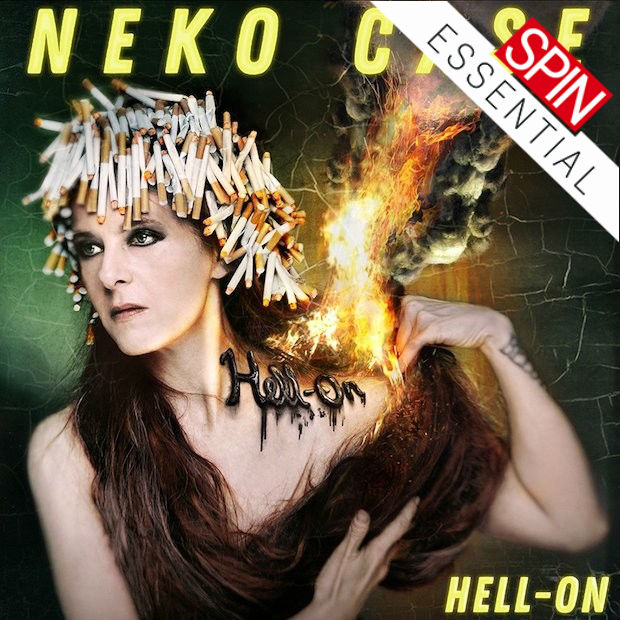2016’s excellent case/lang/veirs made a case for Neko Case as an integral part of the singer-songwriter canon: not shunted off into alt-country but in touch with plenty of genres; not a needlessly traditionalist balladeer but the sort of writer who deploys lines like “dipshit drunk on pink perfume.” Since then, she’s dealt with a fire that destroyed her Vermont home and the emergence of at least one stalker (when your house burns down and everyone reads it in the news, that means everyone). Unlike the largely solo (but excellent) 2013 affair The Worse Things Get, the Harder I Fight, the Harder I Fight, the More I Love You, the collaborative spirit is alive on follow-up Hell-On, while the album remains resolutely, pointedly personal.
Case has called Hell-On a poppier album than her past, but it’s less the money-grab omen such statements often are, but more a sign of subtle departures from form, like a couple choruses that ring a little more, or a couple unexpected instrumental flourishes. The title track begins with eerie kalimba; “Gumball Blue” has the angular melody and cosmic-meets-mundane imagery of a Kristin Hersh track, but New Pornographers keyboardist John Collins dizzies it up to a spacy ‘80s charm. Bjorn Yttling of Peter Bjorn & John co-produces much of Hell-On, including single “Bad Luck,” whose backing vocals and melodic contours aren’t far from the “folk-punk girl group thing” originally envisioned for case/lang/veirs. It’s a neat trick: Yttling primes you for fizzy nostalgia, and indeed the single veers perilously close to the land of rai-ain on your wedding day (“a black fly in the cream” is one word off). But Case, per form, pierces the formula; by the bridge, “that’s bad luck” isn’t standard list-song patter anymore but a bitter punchline.
Case deploys this contrast well and often. “Last Lion of Albion” is stately as it depicts the end of stateliness; “My Uncle’s Navy” begins with a couple of seconds of aggressive guitars, then repudiates that aggression; “Oracle of the Maritimes” casts modern worries and insecurities into the land of myth, where “sometimes I feel so ugly” is the stuff of portentous ballads. (At times it’s too stark contrast; this is a song that sounds vaguely like “The Chain” and also contains the line, “I’m not even wearing underwear.”)
If there’s a touchstone for Hell-On in Case’s catalog it’s “Man,” both in its pop-rock surge and its subtly pointed treatment of gender—which over time has grown less subtle. “I’ve always been [a feminist], it’s just not something I was comfortable calling myself because I didn’t fully understand it… but now I get it,” she told The New York Times. Of course, plenty of lesser songwriters have suddenly got it in these post-#MeToo times, but Case is working several levels of subtlety up. It’s in “Hall of Sarah,” and the way she carefully polishes the vowels of the titular muse’s name—”a name people like to sing,” Case told The Ringer; the warmth of her voice paints new dimensions into the character. On “Winnie,” she neatly inverts the cliché of assigning female names to boats or land—i.e., property: “a bank of warships called ‘she’s.” The track luxuriates in alluded-to sex and overt power: “we were warriors!” she sings, Beth Ditto’s backup vocals their war cry.
Compare the duets with men, including Mark Lanegan and Eric Bachmann (Archers of Loaf, Crooked Fingers), which depict relationships a little too lived-in. Crooked Fingers cover “Sleep All Summer” is an elegy for a dead relationship that still seems like a last best chance; “Curse of the I-5 Corridor”—the curse being the memories strewn down that Canada-Mexico highway, now bereft of the sex and mystery and excitement and, occasionally, trouble that used to be there. The title track addresses gender more obliquely: God is “not a guy,” and Case’s narrator is “agent of the natural world” with all its accompanying force. It’s up there with her best songwriting, too: lyrics that blend the storied theological (“God is not a contract… you cannot time its tables”) with the hyper-tweetable now (“God is a lusty tire fire”). It’s as good a model of modern folk music as has come along in some time.





